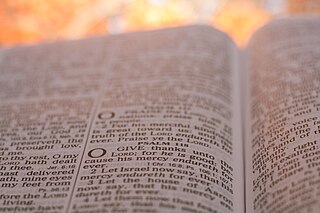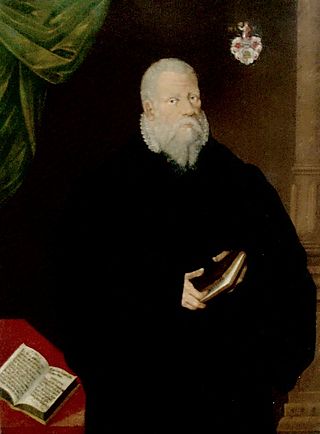Related Research Articles
"Old Hundredth" is a hymn tune in long metre, from the second edition of the Genevan Psalter. It is one of the best known melodies in many occidental Christian musical traditions. The tune is usually attributed to the French composer Louis Bourgeois.

A metrical psalter is a kind of Bible translation: a book containing a verse translation of all or part of the Book of Psalms in vernacular poetry, meant to be sung as hymns in a church. Some metrical psalters include melodies or harmonisations. The composition of metrical psalters was a large enterprise of the Protestant Reformation, especially in its Calvinist manifestation.

The Genevan Psalter, also known as the Huguenot Psalter, is a 1539 metrical psalter in French created under the supervision of John Calvin for liturgical use by the Reformed churches of the city of Geneva in the sixteenth century.

Psalm 98 is the 98th psalm of the Book of Psalms, beginning in English in the King James Version: "O sing unto the Lord a new song; for he hath done marvellous things". The Book of Psalms starts the third section of the Hebrew Bible, and, as such, is a book of the Christian Old Testament. In the slightly different numbering system in the Greek Septuagint version of the Bible, and in the Latin Vulgate, this psalm is Psalm 97. In Latin, it is known as "Cantate Domino". The psalm is a hymn psalm, one of the Royal Psalms, praising God as the King of His people. Like Psalms 33 and 96, it calls for the singing of "a new song".

Psalm 118 is the 118th psalm of the Book of Psalms, beginning in the English of the King James Version: "O give thanks unto the LORD; for he is good: because his mercy endureth for ever." The Book of Psalms is part of the third section of the Hebrew Bible, and a book of the Christian Old Testament. In the slightly different numbering system used in the Greek Septuagint and Latin Vulgate translations of the Bible, this psalm is Psalm 117. In Latin, it is known as "Confitemini Domino". Its themes are thanksgiving to God and reliance on God rather than on human strength.
There are 52 chorale cantatas by Johann Sebastian Bach surviving in at least one complete version. Around 40 of these were composed during his second year as Thomaskantor in Leipzig, which started after Trinity Sunday 4 June 1724, and form the backbone of his chorale cantata cycle. The eldest known cantata by Bach, an early version of Christ lag in Todes Banden, BWV 4, presumably written in 1707, was a chorale cantata. The last chorale cantata he wrote in his second year in Leipzig was Wie schön leuchtet der Morgenstern, BWV 1, first performed on Palm Sunday, 25 March 1725. In the ten years after that he wrote at least a dozen further chorale cantatas and other cantatas that were added to his chorale cantata cycle.
"Nun lob, mein Seel, den Herren" is a Lutheran hymn written in German by the theologian and reformer Johann Gramann in 1525. It was published in 1540 and appears in 47 hymnals. A translation by Catherine Winkworth, "My Soul, now Praise thy Maker!", was published in 1863.

"Es woll uns Gott genädig sein" is a Lutheran hymn, with words written by Martin Luther based on the Psalm 67. The hymn in three stanzas of nine lines each was first published in Wittenberg in 1524. Its best known hymn tune, Zahn No. 7247, was published in Strasbourg in 1524. Heinrich Schütz and Johann Sebastian Bach wrote settings of the hymn. It was translated to English and has appeared in dozens of hymnals.

"In dich hab ich gehoffet, Herr" is a Lutheran hymn in seven stanzas, written by Adam Reusner and first published in 1533. He paraphrased the beginning of Psalm 31. It was first sung to the melody of a Passion hymn. The melody connected with the hymn in 1560 was derived from models dating back to the 14th century. A third melody from 1608 became a hymn tune for several other songs and translations to English. In the German Protestant hymnal Evangelisches Gesangbuch, the hymn appears as EG 257 with the second melody. Johann Sebastian Bach used the second and third melodies in chorale preludes, and the third also in cantatas and the St Matthew Passion.

"Nun lasst uns Gott dem Herren" is a Lutheran hymn of 1575 with words by Ludwig Helmbold. It is a song of thanks, with the incipit: "Nun lasst uns Gott dem Herren Dank sagen und ihn ehren". The melody, Zahn No. 159, was published by Nikolaus Selnecker in 1587. The song appears in modern German hymnals, including in the Protestant Evangelisches Gesangbuch as EG 320.

"Nun danket all und bringet Ehr" is a German Lutheran hymn in nine stanzas, with a text written by Paul Gerhardt. It was first published in 1647, in Johann Crüger's Praxis pietatis melica which was the first publication of hymns by Gerhardt. In the 1653 edition, Crüger added a melody that he composed. As a general song of thanks, the song has appeared in several hymnals, including the German Protestant hymnal Evangelisches Gesangbuch and the Catholic hymnal Gotteslob. It has inspired musical settings by composers from the 17th to the 21st century. Johann Sebastian Bach used the first stanza in a cantata, however with the melody of "Lobt Gott, ihr Christen alle gleich", Hugo Distler composed a chorale cantata, and Günter Berger based a toccata for organ on it.
"Den Herren will ich loben" is a Christian hymn by Maria Luise Thurmair, based on the Magnificat and set to a 1613 melody by Melchior Teschner, which was used for "Valet will ich dir geben". The hymn in three stanzas of eight lines was first written in 1954, and revised in 1971. It appeared in the Catholic hymnal Gotteslob in 1975, and in the current Gotteslob, but also in a German Protestant hymnal. A general song of praise, it has been set to music several times.
"Nun jauchzt dem Herren, alle Welt" is a German Christian hymn, a paraphrase of Psalm 100. The text was written by David Denicke, based on a metered paraphrase of the psalm from the Becker Psalter, and published in his 1646 hymnal. The song appears in modern German-language hymnals, such as the Protestant Evangelisches Gesangbuch and the Catholic Gotteslob. With a joyful melody derived from a 14th-century model, it is one of the most popular psalm songs in German.
"Mein ganzes Herz erhebet dich" is the beginning of German hymns to a melody from the 16th century, which paraphrase Psalm 138. They are part of Protestant and Catholic hymnals.
"Nun lässest du, o Herr" is a Christian hymn by Georg Thurmair written in 1966 as a paraphrase of the Nunc dimittis canticle. It was part of the German Catholic hymnal Gotteslob of 1975 as GL 660 with a 16th-century melody by Loys Bourgeois. With this melody, it is also part of the Protestant hymnal Evangelisches Gesangbuch as EG 695. It is part of the second edition of the Gotteslob as GL 500, with a new 1994 melody.
"Nun singt ein neues Lied dem Herren" is a Christian hymn with German text by Georg Thurmair. He based it on Psalm 98 and wrote it in 1967 to match a traditional 16th-century melody. The song is part of German hymnals, including Gotteslob, and songbooks.

Guillaume Franc was a French musician and composer active in Geneva and Lausanne in the mid-16th century. He is regarded as instrumental in the development of both the Genevan Psalter and the Lausanne Psalter. Some of the melodies are still used in hymns in the 21st century.
"Ich lobe meinen Gott von ganzem Herzen" is a Christian hymn in German, with a first stanza by Gitta Leuschner, written in 1980, and two more stanzas that Günter Balders added in 2002. The text is based on Psalm 9. The original song came from France and was a rather close paraphrase of the psalm, to a melody composed by Claude Fraysse in 1976. The song of the genre Neues Geistliches Lied (NGL) has appeared in the German Protestant and Catholic hymnals and songbooks, especially collections for children.
"Kommt herbei, singt dem Herrn" is a Christian hymn with text by Diethard Zils in 1972, a paraphrase of Psalm 95 to an Israeli melody. It is of the genre Neues Geistliches Lied (NGL), published in 1972. In the 2013 Catholic hymnal Gotteslob, it appears as GL 140. It is also contained in other hymnals and songbooks.
Wohl denen, die da wandeln is a hymn with a text by Cornelius Becker, who paraphased Psalm 119 in 1602. The common melody was composed by Heinrich Schütz in 1661. Versions of it are part of modern Protestant and Catholic hymnals in German.
References
- 1 2 3 4 5 6 7 8 Brüske, Gunda. "Nun saget Dank und lobt den Herren – eine Nachdichtung von Psalm 118". bibelwerk.ch (in German). Retrieved 9 August 2021.
- 1 2 3 4 "Nun saget Dank und lobt den Herren". evangeliums.net. Retrieved 2 August 2021.
- 1 2 "Nun saget Dank und lobt den Herren (L) / Leben in Gott - Lob, Dank und Anbetung". mein-gotteslob.de (in German). Retrieved 11 October 2020.
- ↑ Fischer, Wilfried. "Nun saget Dank und lobt den Herren" (in German). Schott Music . Retrieved 9 August 2021.